5 surprising trends about multifamily unit turnover
Learn how top multifamily operators combat unit turnover and find out five surprising ways to increase resident retention.
Apartment unit turnover can dramatically impact NOI at multifamily communities. But companies that prioritize the resident experience typically enjoy better retention rates. That’s because renters’ priorities have evolved – and they are more inclined to stay in communities that deliver a pleasant living experience.
Residents once prized amenities, like pools or gyms, but now they heavily value convenience, connections, and meaningful living experiences. In other words, resident renewals are often determined by how a community makes residents feel.
Unit turnover is costly for multifamily property managers
Naturally, you may wonder how to make renters feel good about their homes so you can minimize unit turnover. Because losing residents has major financial impacts. Did you know the cost to replace just ONE resident that moves out is nearly $4,000? This is hardly chump change!
If you consistently have residents who move because they are underwhelmed with their community, the costs will eat away at your NOI. Even slight improvements in resident retention can boost your bottom line. So, what are companies doing to combat unit turnover? Our latest Resident Experience Management report gathered perspectives from over 1,000 renters and 600 multifamily companies to provide a dual perspective on the current state of the multifamily resident experience.
Here are five notable takeaways and strategies for apartment operators to better understand and retain their renters.
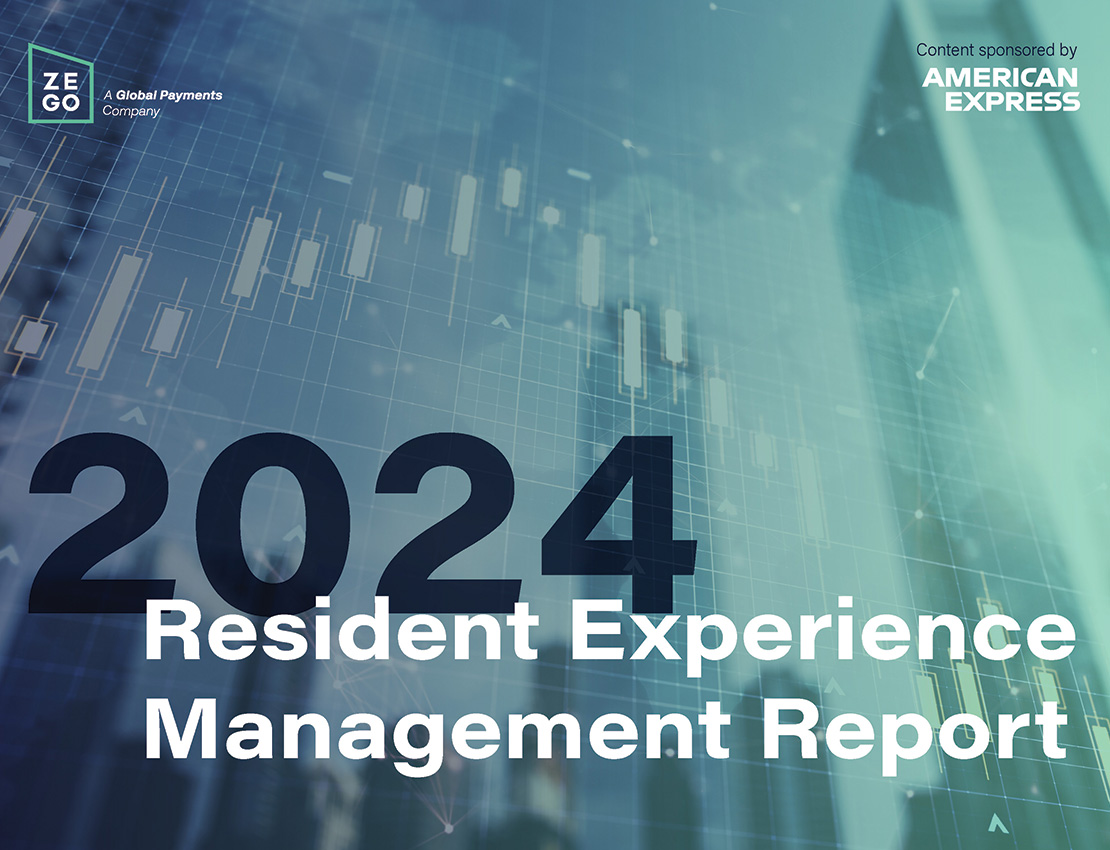
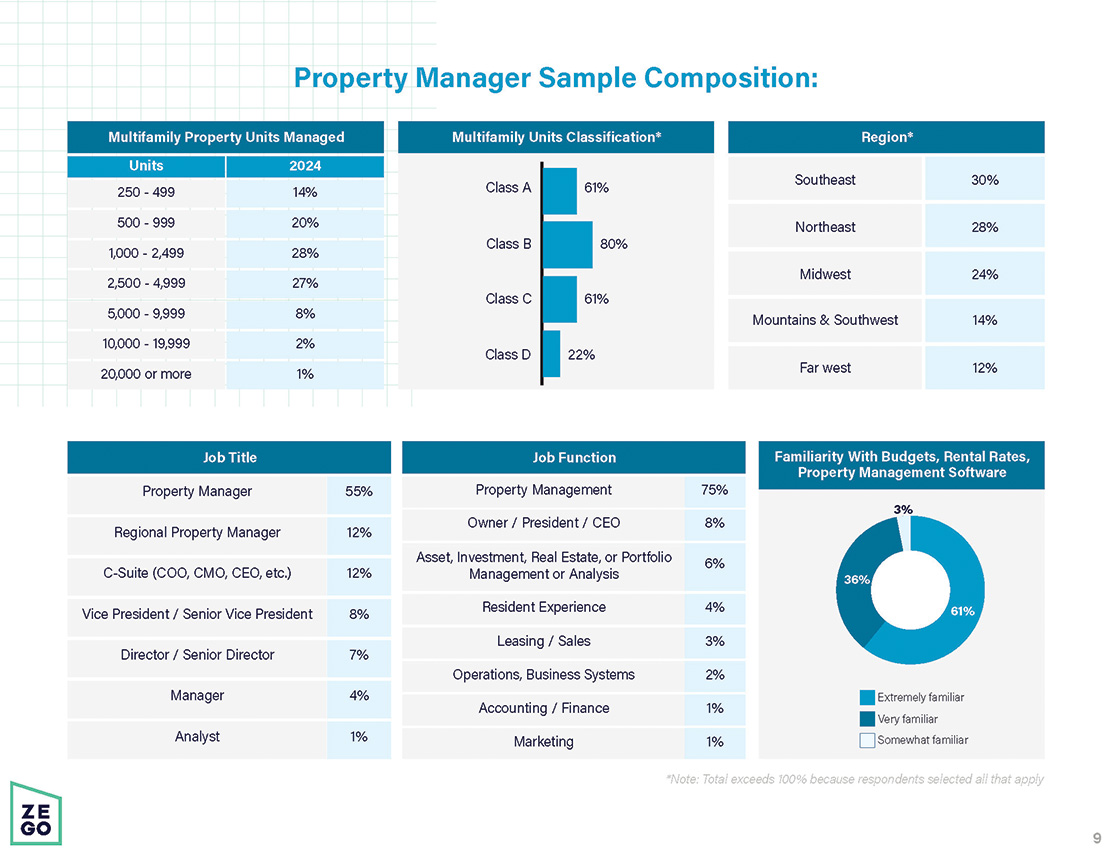
RENTER INSIGHTS
2024 Resident Experience Management Report
Thanks to a survey sponsored by American Express, we’ve gathered perspectives from over 1,000 renters and 600 multifamily companies to provide a dual perspective on the current state of the multifamily resident experience.
#1: Companies keep increasing their retention goals even though most struggle to meet them
Clearly, unit turnover is harmful to your business. That’s why many companies have goals around resident retention that they aim to meet.
Current resident retention rates for management companies
Every year, Zego’s Resident Experience Management Report examines whether companies are setting resident retention goals and meeting those targets. This year, we see that resident retention rates have slightly improved compared to last year. Today’s average retention rate is 60%, the highest average retention rate since Zego began tracking in 2021.

Our takeaway: property managers should look closer at their resident experience
At the same time, companies are setting higher retention goals for themselves. But it’s noteworthy that most companies are falling short of their goals. Today, nearly a third of companies seek to retain more than 70% of their renters, but only 1 in 10 are actually achieving those outcomes.
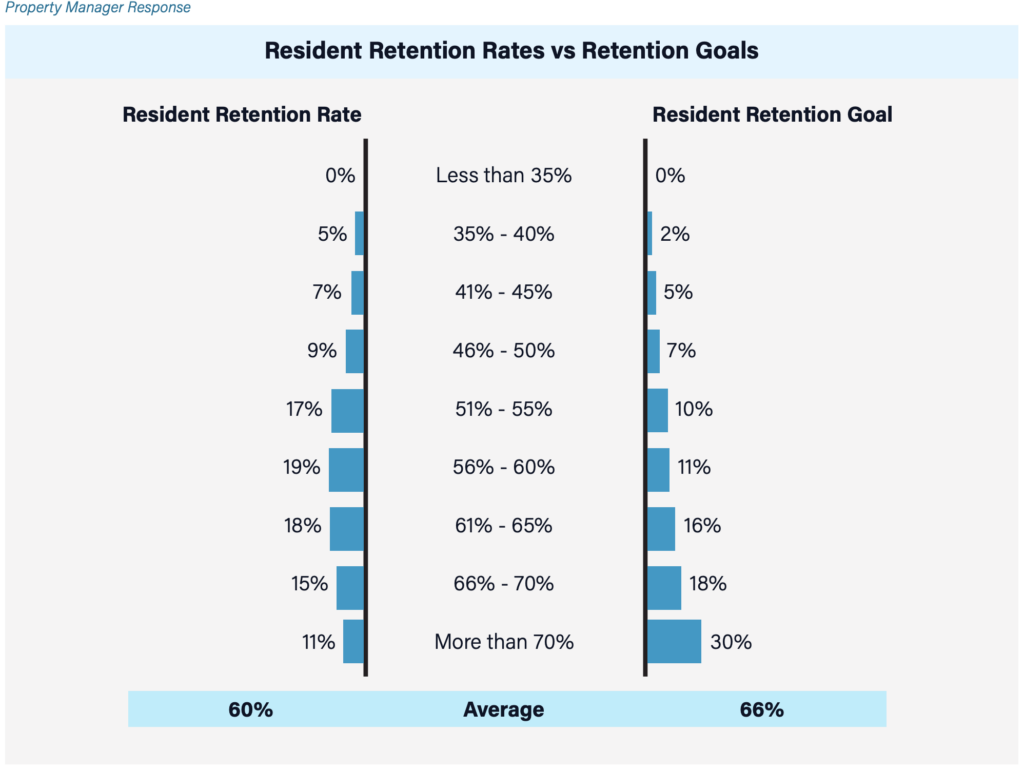
This suggests that companies may not be devoting enough resources to resident satisfaction. Instead, they are likely putting more emphasis on what, traditionally, has been a top business priority: acquiring new residents.
And while that should still remain an important focus, it’s not enough to stay competitive. With turnover costs being what they are, management companies need to focus on creating exceptional resident experiences. That will minimize unit turnover so retention goals are easier to hit.
#2: Property managers are not in tune with why renters move out
Sometimes residents are happy with their community but can’t stay when it’s time to renew. Maybe they got a new job that’s farther away. Or their life circumstances have changed. But more often than not, the decision to leave stems from unhappiness with the community management. We decided to test this theory by asking renters to select the reasons they were not going to renew their lease.
We placed their reasons for moving into two buckets: controllable by management and not controllable by management. This gives us a better understanding of why residents leave a community. For comparison, we also asked property managers to select why they think renters are not renewing in their communities. As it turns out, the reasons that renters move out differ greatly from what property managers think.
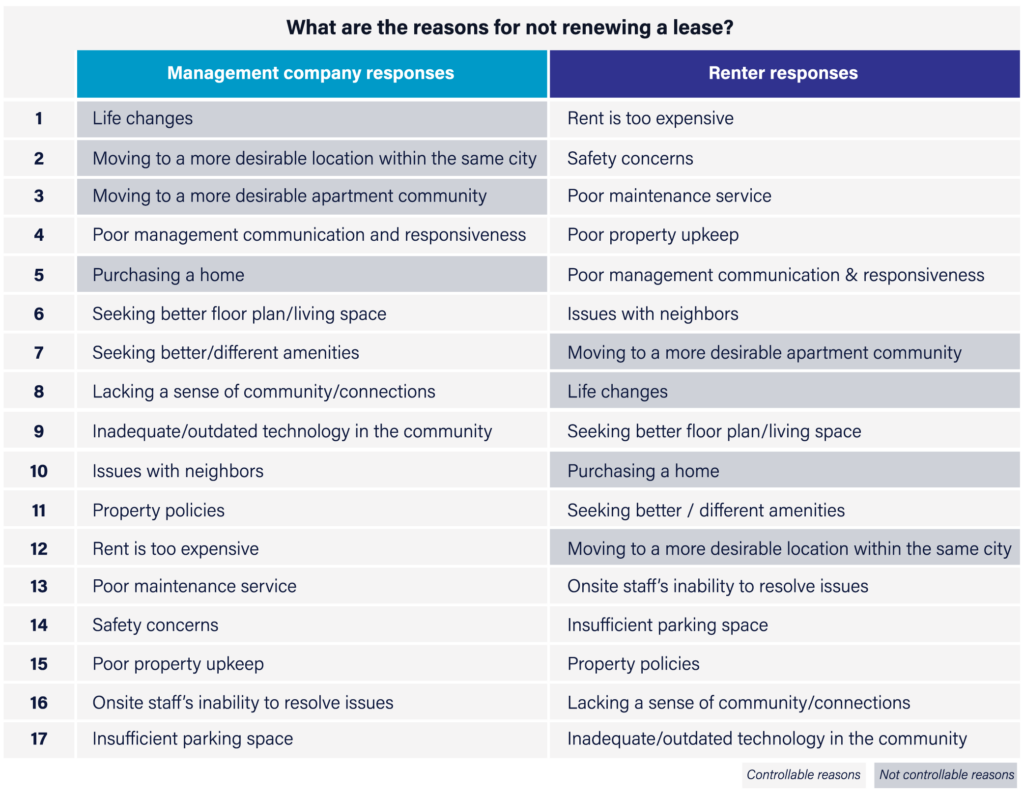
Property managers placed all of the non-controllable reasons within their top 5. But not renters. In fact, some of the uncontrollable reasons are quite far down the list of reasons why renters choose to move. This shows that property managers have much more control over resident turnover than they think.
Property managers have to understand and address what is making renters leave their community if they want to minimize turnover. This is very important for meeting future retention goals. Because 75% of property managers said they thought they would improve their resident retention rates in the next year – hard to do if you aren’t able to identify why renters are leaving in the first place. What makes this even harder is that about 40% of renters said they were planning to move out of their current apartment within the next year.
Our takeaway: Understanding renter wants and needs will minimize unit turnover
There will always be instances of unit turnover that your company cannot prevent. For instance, sometimes renters are relocating to a new city, or have a change in family status. These things are unavoidable and a healthy reason for churn.
However, these instances are the minority. Residents mostly leave their community for reasons that are preventable. The reasons include seeking lower rent, frustration with maintenance, or better communication from their property manager. By focusing on improving the resident experience operators can make a material impact on reducing unit turnover.
It’s wise to examine the key touchpoints across the resident lifecycle. From there, you can find ways to optimize your communities’ living experience. If you can transform some situations that are unpleasant for your residents you may eliminate some instances of unit turnover.
Action Items
#3: Improving maintenance, security, and community appearance will help minimize unit turnover
Resident experience management has many components. We wanted to know which aspect is the most important to renters. Renters made it clear that maintenance, security, and community appearance/cleanliness are far more important to them than anything else. But once again, property managers had different thoughts about what matters the most to their residents.
Property managers said that a tech-enabled lifestyle (which includes amenities like smart locks and thermostats, and in-unit virtual assistants) is most important to renters. However, renters placed this at the bottom of their priority list.
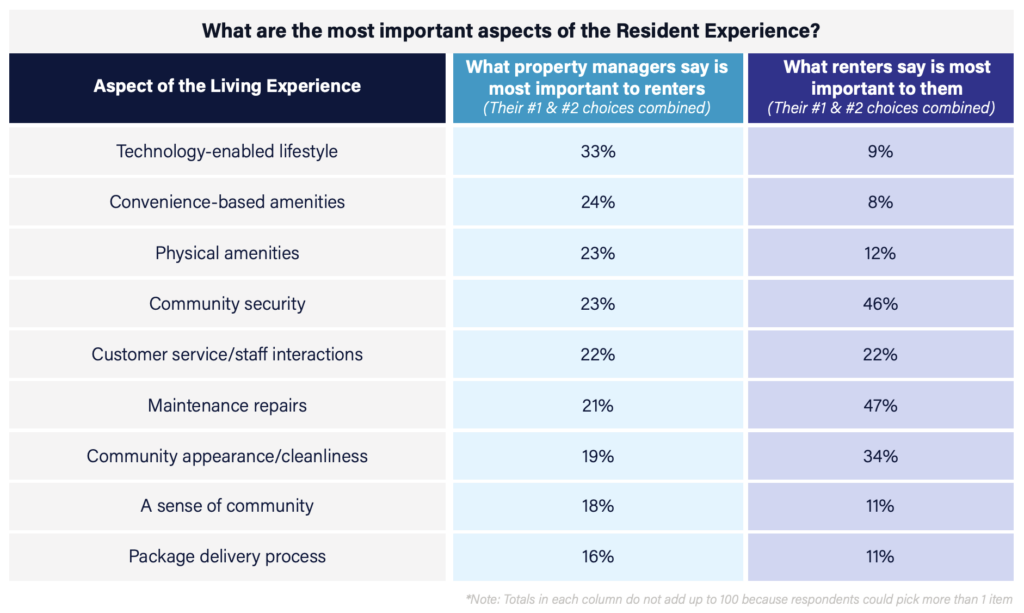
Our takeaway: The basic elements of apartment living are just as important to renters as flashy amenities
Renter responses to our survey show how important a maintenance-free lifestyle is to renters.It’s not the only time renters have vocalized their feelings on these areas. For several years in a row, renters in the NMHC Grace Hill Renter Preferences Survey have also stated that “maintenance-free living” is the top benefit of renting.
It’s likely that you are focusing on providing your residents alluring amenities and perks. And that’s ok. But remember to not lose focus on more “boring” offerings. Renters may be drawn to enticing features like pools, smart technology, or concierge services. But at the heart of their living experience is the peace of mind that a secure and well-cared-for community brings to residents.
#4: Minimizing unit turnover may help lower delinquencies
Property managers are seeing far more instances of fraud and delinquencies than they have in the past. These occurrences crush your NOI. A survey conducted by NMHC found that, on average, multifamily companies have about $4.2 million in bad debt due to fraud and delinquencies.
However, some companies experience fewer instances of delinquencies than others. As it turns out, companies who have lower rates of unit turnover, also have lower rates of delinquency. In fact, companies with lower retention rates are twice as likely to have delinquency rates over 10%.
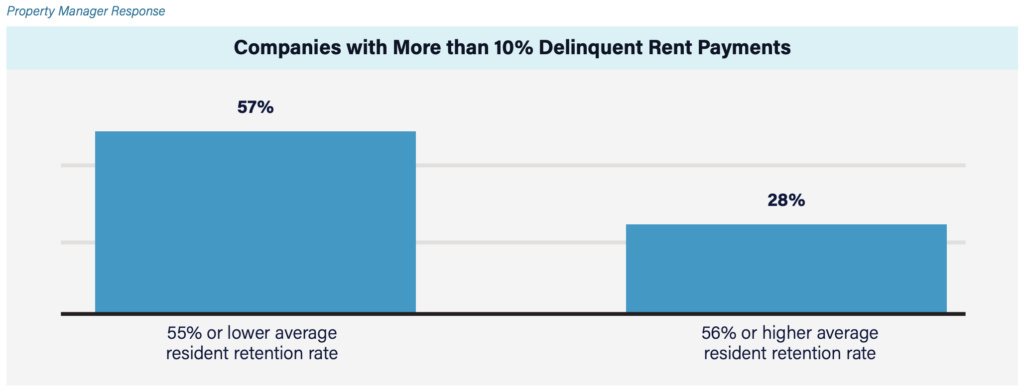
Our takeaway: Achieving a high retention rate also requires making sure renters are a good fit to begin with
It’s likely that property managers who are committed to keeping retention rates up and turnover costs down also take extra precautions to minimize delinquency. This may include stringent financial and employment screening to assess if the candidate can afford the apartment both in the current environment and in the event of an economic downturn.
Taking these precautions will not only help you maintain a healthy retention rate, but it keeps you from the legal and turnover costs that are caused by delinquencies. According to a report from Snappt, the average eviction costs property managers $7,685 after unpaid rent and legal fees!
#5: Understanding and communicating with residents is the biggest challenge for property managers
A surprising factor contributing to renter turnover is that property managers struggle to understand and effectively communicate with their residents. In fact, Zego’s Resident Experience Management Report found that these issues are the top challenge for property managers.
Strong customer service skills and being able to cater to resident wants and needs are must-have skills for any property manager. However, many cite this as their biggest hurdle, and when communication gaps arise, it can quickly lead to frustration, misunderstandings, and ultimately, resident turnover.
Our takeaway: Offering a wide variety of communication channels may improve resident satisfaction
The challenge with effective communication is often rooted by differences in communication preferences. While some renters prefer digital tools like email, text, and resident portals, others value face-to-face interactions with property staff. If property managers rely too heavily on one method while neglecting the other, they risk alienating a portion of their residents.
For example, a renter who prefers digital communication may find it inconvenient to schedule in-person meetings for simple requests, while a resident who prefers direct interaction may feel ignored when they receive only automated responses. These disconnects can create dissatisfaction, leading renters to seek out a property where they feel heard and supported.
Additionally, ineffective communication can result in renters missing key information about lease renewals, maintenance updates, or community policies—factors that directly impact their living experience. If residents feel uninformed or overlooked, they may perceive management as unresponsive or disorganized, prompting them to look elsewhere for housing. By prioritizing clear, consistent, and multi-channel communication, property managers can strengthen relationships with their residents, enhance the living experience, and ultimately reduce unnecessary turnover.
Combat multifamily unit turnover and increase resident retention with Zego
With Zego, you can not only boost resident retention but also improve NOI. Request a demo and see how you can elevate your resident experience, reduce turnover costs, and take your multifamily community to new heights.